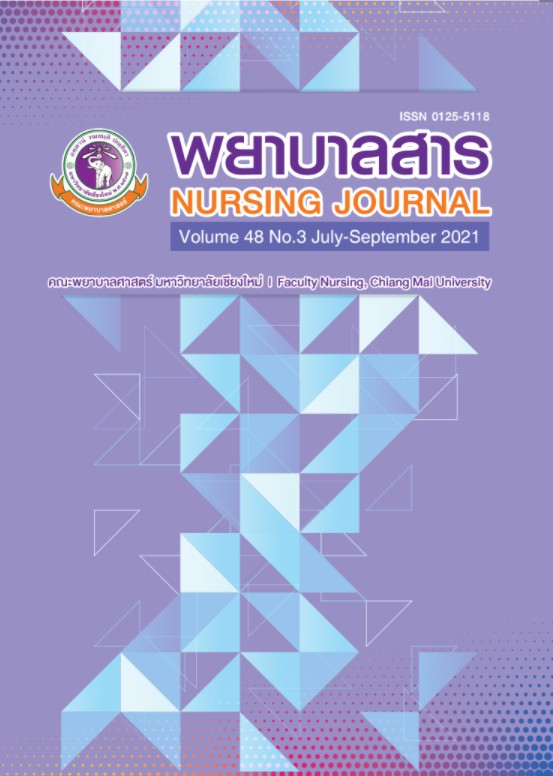Effects of Education Provision and Feedback on Practices for Prevention of Multidrug - Resistant Organisms Among Nurses
Keywords:
Multidrug-resistant organisms, Infection control, Nurses, Healthcare associated infection, FeedbackAbstract
Multidrug-resistant organisms (MDROs) infections are a major problem in critical care units, resulting in longer hospital stays, higher treatment costs, and deaths. This one group pretest posttest quasi-experimental research study aimed to examine the effects of education provision and feedback on practices for MDROs. The intervention consisted of hand hygiene and wearing gloves. The sample consisted of 23 registered nurses in a surgical critical care unit at a tertiary hospital from January to June 2019. The intervention was divided into 3 phases. Phase I consisted of general data collection and observation of hand hygiene and gloves wearing, while Phase II involved educating the sample group using lectures, demonstrations, and return demonstrations. Phase III addressed personal and group feedback using the following 5 steps: Step 1: define common target goals (target); Step 2: practice how to observe, use and record in the recording form (train); Step 3: provide feedback (feedback); Step 4: group discuss and comment (share); and Step 5: setting goals and develop practices (act).
The research instruments consisted of the demographic data form and the observational recording hand hygiene and gloves use form. All instruments were tested for validity and reliability. Data were analyzed using descriptive statistics and the Chi-squared test.
The results of the study showed that after implementation of education and feedback, the correct practice of hand hygiene increased significantly from 17.56% to 92.08% (p<.001) and the correct practice of wearing gloves increased significantly from 71.24% to 98.96% (p<.001).
This study shows that education provision and feedback can be used to improve MDROs infection prevention practice among nurses. Future study into the effects of education provision and feedback among nurses on the incidence of MDROs infections is suggested.
References
Burdsall, D. P., Gaerner, S. E., Cox ,T., Schweizer, M., Culp, K. R., Steelman, V. M., & Herwaldt, L. A. (2017). Exploring inappropriate certified nursing assistant glove use in long-term care. American Journal of Infection Control, 45(9), 940-945.
Cai, B., Echols, R., Magee, G., Arjona Ferreira, J. C., Morgan, G., Ariyasu, M., … Nagata, T. D. (2017). Prevalence of carbapenem-resistant gram-negative infections in the United States predominated by Acinetobacter Baumannii and Pseudomonas Aeruginosa. Open Forum Infections Disease, 4(3), 1-7.
Centers for Disease Control and Prevention. (2006). Management of multidrug-resistant organisms in healthcare setting. Retrieved from http://www.cdc.gov/hicpac/pdf/MDRO/ MDRO Guideline 2006.pdf
Chu, L.K., & Chu, G. S. P. (1991). Feedback and efficiency: A staff development model. Nursing Management, 22(2), 28-31.
Duangmoragot, N., Moongtui, W., & Soparat, P. (2005). Effect of participatory learning on practices among nurses for the prevention and control of multi-drug resistant bacterial infection Chumphonkhetudomsakdi Hospital. Nursing Journal, 4(21), 83-90. (in Thai)
Gavr ieli, E., Drach-Zahav y, A., Tal, I., Rahav, G., & Ben-David, D. (2015). The effects of immediate and delayed feedback on hand hygiene compliance. Antimicrobial Resistance and Infection Control, 4(Suppl 1), P287.
Hepsi, B. J. (2015). Knowledge and practice of health care workers on infection control measures. Asian Journal Nursing Education and Research, 5(4), 518-522.
Ickes, H. L. (1992). Feedback. In S. Smith (Ed.), Communications in nursing (2nd ed., pp. 200-209). St. Louis: Mosby-Year Book.
Katherason, S. G., Naing, L., Jaalam, K., Mohamad, N. A. N., Bhojwani, K., Harussani, N. D. S. H., & Ismail, A. (2010). Hand decontamination practices and the appropriate use of gloves in two adult intensive care units in Malaysia. The Journal of Infection in Developing Countries, 4(02), 118-123.
Kuruno, N., Kasahara, K., & Mikasa, K. (2017). Hand hygiene compliance in a universal gloving setting. American Journal of Infection Control, 45(8), 830-4
National Antimicrobial Resistance Surveillance Center Thailand. [NARST] (2018). Antimicrobial Resistance 2000-2018. Retrieved from http://narst.dmsc.moph.go.th/data/AMR%202000-2018.pdf
Thongcharoen, P., Moongtui, W., & Unahalekhaka, A. (2015). Effects of using multifaceted strategic method on practices of healthcare personnel in prevention of multidrug resistant bacterial Infection. Nursing Journal, 42(1), 61-73. (in Thai)
Unahalekhaka, A. (2013). Epidemiology and evidence-based practice guideline in prevention of hospital-associated infection. Chiang Mai: Mingmuang printing house. (in Thai)
Varasunun, P. (2015). Developing learners by using peer feedback. RMU. Journal (Humanities and Social Sciences). 9(1): January - April 2015: 33-40. (in Thai)
World Health Organization. (2009). WHO Guidelines on hand hygiene in healthcare first safety challenge clean care is safer care. Retrieved from http://www.who.int/publication/2009/ 9789241597906eng.pdf.
Downloads
Published
How to Cite
Issue
Section
License
บทความที่ได้รับการตีพิมพ์เป็นลิขสิทธิ์ของวารสารพยาบาลสาร
ข้อความที่ปรากฏในบทความแต่ละเรื่องในวารสารวิชาการเล่มนี้เป็นความคิดเห็นส่วนตัวของผู้เขียนแต่ละท่านไม่เกี่ยวข้องกับมหาวิทยาลัยเชียงใหม่ และคณาจารย์ท่านอื่นๆในมหาวิทยาลัยฯ แต่อย่างใด ความรับผิดชอบองค์ประกอบทั้งหมดของบทความแต่ละเรื่องเป็นของผู้เขียนแต่ละท่าน หากมีความผิดพลาดใด ๆ ผู้เขียนแต่ละท่านจะรับผิดชอบบทความของตนเองแต่ผู้เดียว






